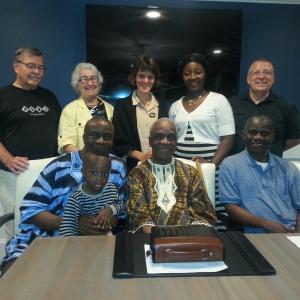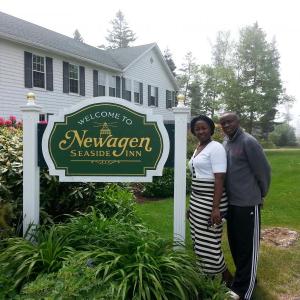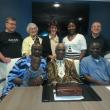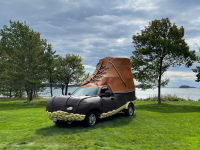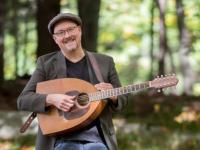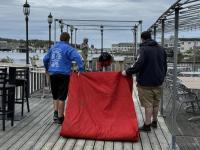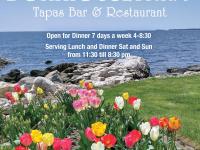'Big problems, big opportunities': Southport summit ignites hope in post-conflict African countries
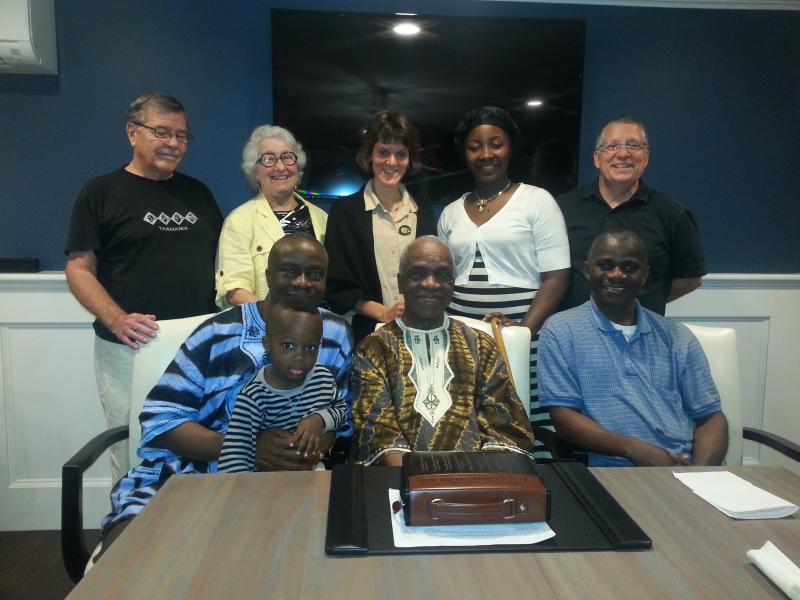 Some of the presenters at the summit held at Newagen Seaside Inn. Pictured from left are, back row: Professor Ralph Kee of Gordon Conwell Theological Seminary, Boston, Mass. campus; the Rev. Judith Kee, MPH, Universal Human Rights International (UHRI) Boston, Mass.; Dr. Carmen E. Aldinger, MPH, consultant to UN agencies and nonprofit organizations; Saawile Krua, wife of Torli Krua; Dr. Gregg Detwiler, director, intercultural ministries, Emmanuel Gospel, center; front row: Torli H. Krua, founder, YOUNG-Africa (holding his son, Mahn); the Rev. Mahn C. Krua Sr., proprietor, Ziah Mission School-Liberia; Michael Mendoabor, manager, High Tech Applications Liberia. Courtesy of Torli H. Krua
Some of the presenters at the summit held at Newagen Seaside Inn. Pictured from left are, back row: Professor Ralph Kee of Gordon Conwell Theological Seminary, Boston, Mass. campus; the Rev. Judith Kee, MPH, Universal Human Rights International (UHRI) Boston, Mass.; Dr. Carmen E. Aldinger, MPH, consultant to UN agencies and nonprofit organizations; Saawile Krua, wife of Torli Krua; Dr. Gregg Detwiler, director, intercultural ministries, Emmanuel Gospel, center; front row: Torli H. Krua, founder, YOUNG-Africa (holding his son, Mahn); the Rev. Mahn C. Krua Sr., proprietor, Ziah Mission School-Liberia; Michael Mendoabor, manager, High Tech Applications Liberia. Courtesy of Torli H. Krua
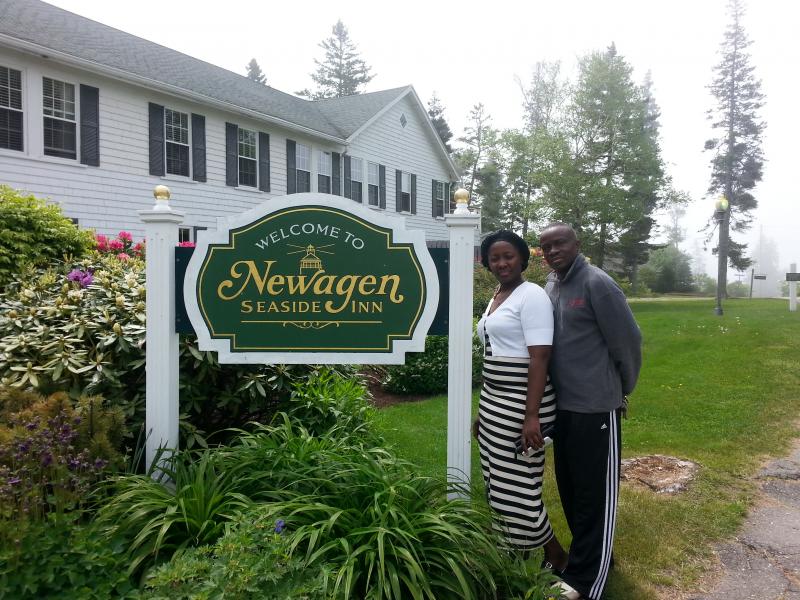 Standing outside Newagen Seaside Inn are Saawile Krua, wife of Torli Krua, and Torli H. Krua, founder, YOUNG-Africa. Courtesy of Torli H. Krua
Standing outside Newagen Seaside Inn are Saawile Krua, wife of Torli Krua, and Torli H. Krua, founder, YOUNG-Africa. Courtesy of Torli H. Krua
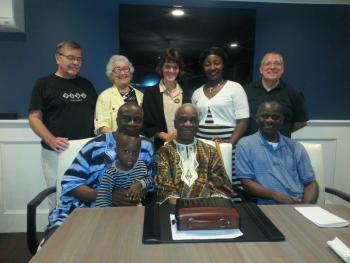 Some of the presenters at the summit held at Newagen Seaside Inn. Pictured from left are, back row: Professor Ralph Kee of Gordon Conwell Theological Seminary, Boston, Mass. campus; the Rev. Judith Kee, MPH, Universal Human Rights International (UHRI) Boston, Mass.; Dr. Carmen E. Aldinger, MPH, consultant to UN agencies and nonprofit organizations; Saawile Krua, wife of Torli Krua; Dr. Gregg Detwiler, director, intercultural ministries, Emmanuel Gospel, center; front row: Torli H. Krua, founder, YOUNG-Africa (holding his son, Mahn); the Rev. Mahn C. Krua Sr., proprietor, Ziah Mission School-Liberia; Michael Mendoabor, manager, High Tech Applications Liberia. Courtesy of Torli H. Krua
Some of the presenters at the summit held at Newagen Seaside Inn. Pictured from left are, back row: Professor Ralph Kee of Gordon Conwell Theological Seminary, Boston, Mass. campus; the Rev. Judith Kee, MPH, Universal Human Rights International (UHRI) Boston, Mass.; Dr. Carmen E. Aldinger, MPH, consultant to UN agencies and nonprofit organizations; Saawile Krua, wife of Torli Krua; Dr. Gregg Detwiler, director, intercultural ministries, Emmanuel Gospel, center; front row: Torli H. Krua, founder, YOUNG-Africa (holding his son, Mahn); the Rev. Mahn C. Krua Sr., proprietor, Ziah Mission School-Liberia; Michael Mendoabor, manager, High Tech Applications Liberia. Courtesy of Torli H. Krua
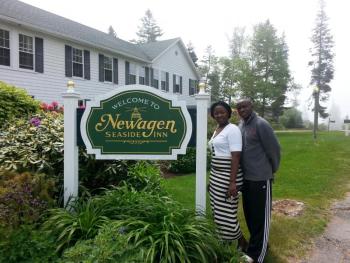 Standing outside Newagen Seaside Inn are Saawile Krua, wife of Torli Krua, and Torli H. Krua, founder, YOUNG-Africa. Courtesy of Torli H. Krua
Standing outside Newagen Seaside Inn are Saawile Krua, wife of Torli Krua, and Torli H. Krua, founder, YOUNG-Africa. Courtesy of Torli H. Krua
YOUNG-Africa hosted its first Social Entrepreneurship Summit June 8-10 at the Newagen Seaside Inn, Southport.
When YOUNG-Africa’s co-founders, Torli Krua, a Baptist minister in Boston, and Stephen Hunter, an economics and English instructor at Qiqihar University, Heilongjiang, China, conducted entrepreneurship seminars in cities across war ravaged Liberia in February 2014, they were overwhelmed not only by the myriad difficulties citizens of Liberia faced daily but also the enthusiasm of Liberians to create business solutions from the problems that challenged their existence daily.
The problems caused by the war include abject poverty, corruption, lack of access to technology, portable water and electricity. The roads are impassable, especially during the rainy season.
Brushing off decades of death and destruction, resilient returning Liberian refugees without access to opportunities and options are forced to dream of ways to improve their lives and change their country, Liberia, and the continent of Africa through entrepreneurship.
However, they needed to be inspired daily, equipped and given access to entrepreneurial resources and mentoring.
The big problems of Liberia are really big opportunities for entrepreneurs. For example, unemployment is skyrocketing in Liberia, a country with a population of 4.5 million people, of which “76 percent has an income of less than US $1 a day and 52 percent less than US $0.50 a day,” according to EnergyPedia.info.
This problem also means cheap labor for Liberian entrepreneurs.
Prior to the war in 1989, only 35,000 customers, mainly residents of the capital city, Monrovia had access to electricity. The access rate to public electricity in 2014 is roughly 1 percent. Due to poverty, most Liberians cannot even afford electricity. This country has one of the highest public tariffs in the world (in October 2012 $0.52/kWh). With an area of 43,000 square miles, Liberia has only one office for the registry of motor vehicles and driver’s licenses, and the central post office does not deliver mail but rents mail boxes. However, with most places unreachable by bad roads, renting mail boxes is not a viable option as people cannot afford the cost of the trip to check mail boxes let alone the cost of mail boxes.
“Unlike Americans, who take their freedom for granted and complain about every poor service, Liberians without basic services do not even complain,” said Menwon Paye, a former Liberian refugee and resident of Cambridge, Mass.
Just how did Southport, of all places, become the site for an African refugee social enterprise summit? It all started when Krua, upon returning from his tour of post-conflict Liberia and Sierra Leone, was invited to preach at Boothbay Baptist Church in March 2014. In his sermon, “Salvation Comes From God,” Krua challenged Christians in Boothbay to move beyond the role of cheering spectators in church pews on Sundays. He urged people to get involved in serving the poor and making a difference locally and globally.
Jason D. Schlosser, general manager of Newagen Seaside Inn and a member of Boothbay Baptist Church, walked up to Krua after the service and asked “What can we do to impact the lives of refugees in America and help to transform the lives of returning refugees in Africa?”
Krua introduced Schlosser to YOUNG-Africa.org and Ziah Mission Baptist Church of Dorchester, two refugee-led initiatives simultaneously impacting lives in the United States and Africa. Schlosser suggested the idea of a summit aimed at collaboration with refugees in the U.S. and partnering with returning refugees in post-conflict Africa. Schlosser had since made two trips, including one trip on Mother's Day with his wife and children to worship at the refugee-led Ziah Mission Church in Dorchester.
“We need to partner with you and help you carry out the vision God has given you to love and serve refugees,” Schlosser said. He suggested a two nights-three days summit to reflect on the ongoing work of Rev. Krua and brainstorm innovative ways of collaboration with Krua for mutual benefits.
Krua invited other colleagues to join the deliberations. Don Miller of First Baptist Church, Portland, Dr. and Mrs. Steven B. Nash and Fay Christy of Boothbay Baptist joined participants from Maine, Boston, Staten Island as well as presenters who made use of electronic media to communicate from Sierra Leone and Liberia. Other presenters included Ralph Kee of Gordon Conwell Theological Seminary, Boston, Rev. Judith Kee who trained at Johns Hopkins School of Public Health and served 20 years as medical missionary in the Congo, Dr. Gregg Detwiler, director of intercultural ministries at Emmanuel Gospel Center, Dr. Carmen E. Aldinger, consultant to UN agencies and nonprofit organizations, Rev. Mahn C. Krua Sr., 90, Liberian educator, Ava Schlosser, 9, student, Jaden Schlosser, 14, student, and others.
Aldinger spoke of challenges faced by American church missions committees in creating awareness within their own congregations about local and global needs and connecting parishioners to missionaries serving overseas.
Mahn Krua Sr. spoke through an interpreter and underscored the fact that some missionaries serving in Africa only seek their own interest by narrowly focusing only on spiritual matters and not taking interest in the welfare of Africans through support of education, healthcare and entrepreneurship.
Judith Kee spoke of the 20 years serving in the Congo and how her students were trained to improve and continue her work as well as the problem of Americans forgetting about the people and the place once American missionaries return home.
Ralph Kee presented the biblical mandates of the church to extend the Kingdom of God.
Detwiler called on Christians to love immigrants and refugees, especially those within our neighborhoods.
Schlosser said, “It’s not fair when athletes who have fun playing their favorite sports earn $5 million yearly while Africans who work very hard to support their families only earn $500 yearly.”
A refugee who returned to her native country after the war ended, Kadijatu Wellington of Freetown, Sierra Leone spoke about why she left a high paying job at John Hancock in Boston, Mass., to live in a village without a job, electricity, running water, etc. “I am making a difference in the lives of hundreds of children at the school I established and the women I have provided skills training to become self-sufficient.”
Another refugee who returned to Liberia, Marie Weedor, 46, a mother of seven children said she needs $300 to start a soap making business because of the high demand of soap.
Jonathan Weedor, 17, a painter desires to build an arts studio and begin selling his artwork online and at the studio. Weedor needs startup capital and a business partner.
Dave Weedor, 21, has plans to start a snail farm and begin supplying snail meat to the local market as well as exporting the delicacy overseas. He also is looking for investors and startup capital.
The next step is to review YOUNG-Africa’s business plan and find a way to begin inviting and listening to the stories of refugees in the U.S. as well as helping returning refugees through entrepreneurial resources, mentoring and capital for new start-up businesses. Schlosser and some members of his church plan to establish an exchange program that brings together the Boothbay church and the refugee-led Ziah Mission Church, Dorchester, Mass. beginning on June 22.
YOUNG-Africa will conduct another entrepreneurship seminar, which will be followed by a business idea competition and a trade fair to showcase the products and services of all YOUNG-Africa entrepreneurs. Schlosser was invited to join the YOUNG-Africa delegation to go to Liberia in the fall. Success stories of refugee entrepreneurs will be documented to give more exposure to this model.
Given the creativity and enthusiasm, combined with the resilience, determination and entrepreneurial prowess of returning refugees, and coupled with the new found friendship, compassion and concern from Boothbay Maine, it seems Africa’s big problems, will, doubtless, result in the creation of opportunities and hope for Africans. The troubled continent and its peoples may now dream of a transition from the land of unlimited problems to the new Land of Opportunities with returning refugees leading the way.
Event Date
Address
United States

